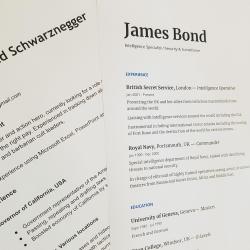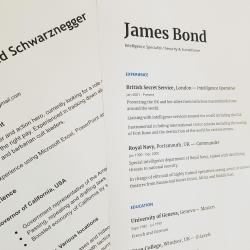How to Write a Resume That Gets Noticed
Having a stand-out resume is more important than ever. A well-crafted resume serves as your personal marketing tool, effectively showcasing your skills, experience, and accomplishments to potential employers. Here’s a comprehensive guide to writing a resume that demands attention and lands interviews.
1. Tailor Your Content
Customize for Each Job: One of the most critical steps is tailoring your resume for each job application. Carefully read the job description, identify the key skills and qualifications the employer is seeking, and highlight these in your resume.
Use Relevant Keywords: Integrate industry-specific keywords and phrases found in the job posting. This not only helps pass through Applicant Tracking Systems (ATS) but also assures the recruiter that you understand what is required for the role.
2. Choose the Right Format
Select an Appropriate Layout: Depending on your career level and history, choose a format that best showcases your strengths. The most common formats are chronological, functional, and combination:
- Chronological: Ideal for those with a strong, continuous work experience.
- Functional: Suitable for those with gaps in employment or who are changing career paths.
- Combination: A blend of both, highlighting skills while providing a chronological work history.
Keep It Professional: Use a clean, professional font such as Arial, Calibri, or Times New Roman. Ensure the structure is consistent, with clear headings and bullet points that enhance readability.
3. Start with a Strong Summary or Objective
Craft a Compelling Introduction: Start your resume with a concise summary or objective that encapsulates who you are, your experience, and what you bring to the table. For example:
- Summary: "Dynamic marketing professional with over five years of experience driving successful social media campaigns and increasing brand engagement by 30%."
- Objective: "Ambitious engineering graduate seeking to leverage technical skills in a challenging position at a forward-thinking organization."
4. Highlight Relevant Experience
Emphasize Achievements Over Duties: Employers are more interested in what you have accomplished rather than your job duties. Use quantifiable achievements that demonstrate your impact, using metrics whenever possible (e.g., "increased sales by 15%" or "streamlined processes resulting in a 20% efficiency gain").
Include Volunteer Work and Internships: If you lack professional experience, include relevant volunteer work or internships that demonstrate your skills and initiative.
5. Showcase Your Skills
Create a Skills Section: Highlight both hard and soft skills that are relevant to the job. Hard skills might include proficiency in software programs or data analysis, while soft skills could be leadership or communication abilities.
Balance Technical and Personal Skills: Employers value well-rounded candidates, so ensure you present a balanced mix of both types.
6. Education and Certifications
Highlight Relevant Education: Place your education section after your experience, especially if you have significant work achievements. Include relevant coursework, honors, and GPA if recent and above average.
List Certifications: If applicable, include any professional certifications or licenses that add value to your resume, prioritizing those mentioned in the job description.
7. Proofread and Polish
Eliminate Errors: Ensure your resume is free of spelling and grammatical errors, which can detract from your professionalism. Consider asking a friend or mentor to review it for you.
Keep It Concise: Aim for a one-page resume if you have less than 10 years of experience, and no more than two pages otherwise. Be succinct and only include information that strengthens your application.
8. Include a Cover Letter
Complement with a Cover Letter: When possible, accompany your resume with a personalized cover letter that explains why you are interested in the position and how your experience relates to the company’s needs.
Conclusion
Crafting a resume that stands out requires attention to detail, relevance, and a clear presentation of your professional narrative. By following these guidelines, you’ll be better prepared to catch the attention of recruiters and secure that coveted interview. Remember, your resume is often your first impression—make it count!






















